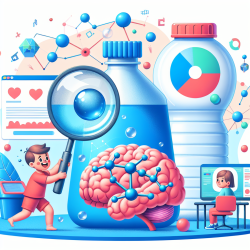Understanding the Impact of Water Composition on Cognitive Function
As practitioners in the field of speech-language pathology, we strive to create optimal outcomes for our clients, especially children. While our focus often lies in direct therapeutic interventions, understanding environmental factors that influence cognitive health is equally crucial. Recent research, "Association between the Composition of Drinking Water and Cognitive Function in the Elderly: A Systematic Review," sheds light on how the composition of drinking water can impact cognitive function, offering insights that can be valuable for our practice.
Key Findings from the Research
The systematic review evaluated 10 studies focusing on the elderly, analyzing the relationship between trace elements in drinking water and cognitive function. Key trace elements included aluminum, silica, calcium, and fluoride. The findings revealed:
- Aluminum: Four studies indicated an increased risk of cognitive decline with higher aluminum exposure, while others found no association.
- Silica and pH Levels: Higher levels of silica and pH were protective against cognitive decline.
- Calcium: Two studies suggested a protective effect of calcium against cognitive decline.
Implications for Practitioners
While the study focuses on the elderly, the implications of these findings can extend to younger populations, including children. Understanding these environmental influences can guide us in advocating for better water quality in schools and communities, potentially enhancing cognitive outcomes in children.
Encouraging Further Research
The study highlights the need for further research, particularly in measuring multiple trace mineral levels across various water sources. As practitioners, we can contribute by:
- Encouraging schools and communities to test water sources for trace elements.
- Collaborating with researchers to study the impact of water composition on children's cognitive development.
- Advocating for policy changes that ensure safer drinking water standards.
Conclusion
As we continue to focus on data-driven practices, understanding the broader environmental factors affecting cognitive health is essential. By incorporating these insights into our work, we can contribute to better cognitive outcomes for children and promote healthier communities.
To read the original research paper, please follow this link: Association between the Composition of Drinking Water and Cognitive Function in the Elderly: A Systematic Review.










